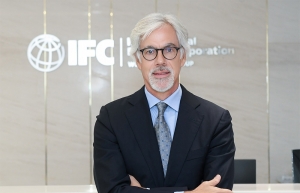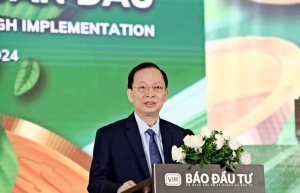Green banking takes root in Vietnam
Sharing insights on the current ESG implementation in the banking sector at a seminar hosted by VIR on November 19, Nguyen Thuy Duong, chairwoman of EY Vietnam, shared that while governance is well-established in Vietnam’s banking sector, the implementation of environmental and social aspects remains challenging, though progress is being made.
"About 70 per cent of banks in Vietnam are aware of ESG principles and are working on their integration at various levels. This growing awareness marks the first step in what is a complex journey for the banking sector.”
 |
| Nguyen Thuy Duong, chairwoman of EY Vietnam |
EY Vietnam’s chairwoman stated that the initial phase of ESG integration involves banks recognising its importance, consulting relevant government regulations, and forming dedicated ESG task forces.
The second stage of ESG implementation is more complex, as it requires banks to rethink their lending portfolios, particularly by incorporating green loans. Duong highlighted that the inherent complexity of banking operations, managing funds, ensuring financial safety, and meeting the needs of shareholders would make this transition slower.
"Banks must meet safety targets set by the State Bank of Vietnam while also ensuring the interests of shareholders, making green investments a complex undertaking," she explained.
The challenge is balancing immediate financial benefits with long-term sustainable goals. A misconception persists that green loans come with lower interest rates when funded by international organisations or Official Development Assistance.
"After balancing these factors, we have realised that there is never a situation where green projects come with lower interest rates. This is because businesses must comply with regulations and criteria, and the regulatory requirements of European markets, for example, make it more expensive for businesses to meet these standards when exporting goods," said Duong.
Duong noted that green projects often come with higher costs due to the stringent regulations businesses must comply with. “As banks advance to the third stage of ESG implementation, they are focused on monitoring and managing green loans more effectively.”
“For example, BIDV has committed 4.1 per cent of its total loan portfolio to green loans and actively tracks the impact of these funds to encourage more businesses to participate in sustainable projects. While managing large datasets and adhering to regulations remains a challenge, banks are making strides towards balancing traditional and green lending to support overall credit growth,” added Duong.
Financing for green projects is becoming more pragmatic. "Instead of focusing on large-scale green buildings, banks are increasingly financing specific elements, such as improving energy consumption efficiency in buildings. This approach is more measurable and manageable, allowing both banks and businesses to promote their green initiatives for public relations purposes, thereby enhancing their brand reputations and credibility."
However, Duong emphasised that true ESG implementation requires more than just surface-level efforts. "ESG should be embedded in the core operations of banks, rather than treated as a superficial measure. Banks must make deliberate and strategic progress in areas like capital allocation and risk management, particularly in relation to climate change risks," she advised.
“Some banks, although not yet publicly disclosing their ESG efforts, are laying a solid foundation to ensure their strategies are ready for announcement when the time comes. This careful preparation will ensure that when banks publicly commit to their ESG strategies, they will be fully equipped to meet their goals and contribute to sustainable development in the long run.”
 | Banking on banks to finance the green transition Vietnam’s green goals require huge sums in order for them to succeed. Thomas Jacobs, country manager for Vietnam, Cambodia, and Laos at the International Finance Corporation, looks at capacity-building measures and the hurdles that must be overcome. |
 | ESG implementation in banking: from awareness to action Deputy Governor of the State Bank of Vietnam Dao Minh Tu emphasised that increasing ESG implementations requires financial institutions to consistently comply with evolving regulations, demonstrating environmental and social responsibility while enhancing their credibility and transparency. |
 | ESG represents a shift towards sustainability for banks At a seminar on environmental, social, and governance (ESG) factors in the banking sector hosted by VIR on November 19, industry experts assessed that banks have performed exceptionally well in governance, while the environmental and social aspects remain challenging. |
What the stars mean:
★ Poor ★ ★ Promising ★★★ Good ★★★★ Very good ★★★★★ Exceptional
 Tag:
Tag:
Related Contents
Latest News
More News
- Bac Ai Pumped Storage Hydropower Plant to enter peak construction phase (January 27, 2026 | 08:00)
- ASEAN could scale up sustainable aviation fuel by 2050 (January 24, 2026 | 10:19)
- 64,000 hectares of sea allocated for offshore wind surveys (January 22, 2026 | 20:23)
- EVN secures financing for Quang Trach II LNG power plant (January 17, 2026 | 15:55)
- PC1 teams up with DENZAI on regional wind projects (January 16, 2026 | 21:18)
- Innovation and ESG practices drive green transition in the digital era (January 16, 2026 | 16:51)
- Bac Ai hydropower works stay on track despite holiday period (January 16, 2026 | 16:19)
- Fugro extends MoU with PTSC G&S to support offshore wind growth (January 14, 2026 | 15:59)
- Pacifico Energy starts commercial operations at Sunpro Wind Farm in Mekong Delta (January 12, 2026 | 14:01)
- Honda launches electric two-wheeler, expands charging infrastructure (January 12, 2026 | 14:00)






















 Mobile Version
Mobile Version